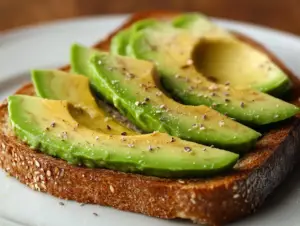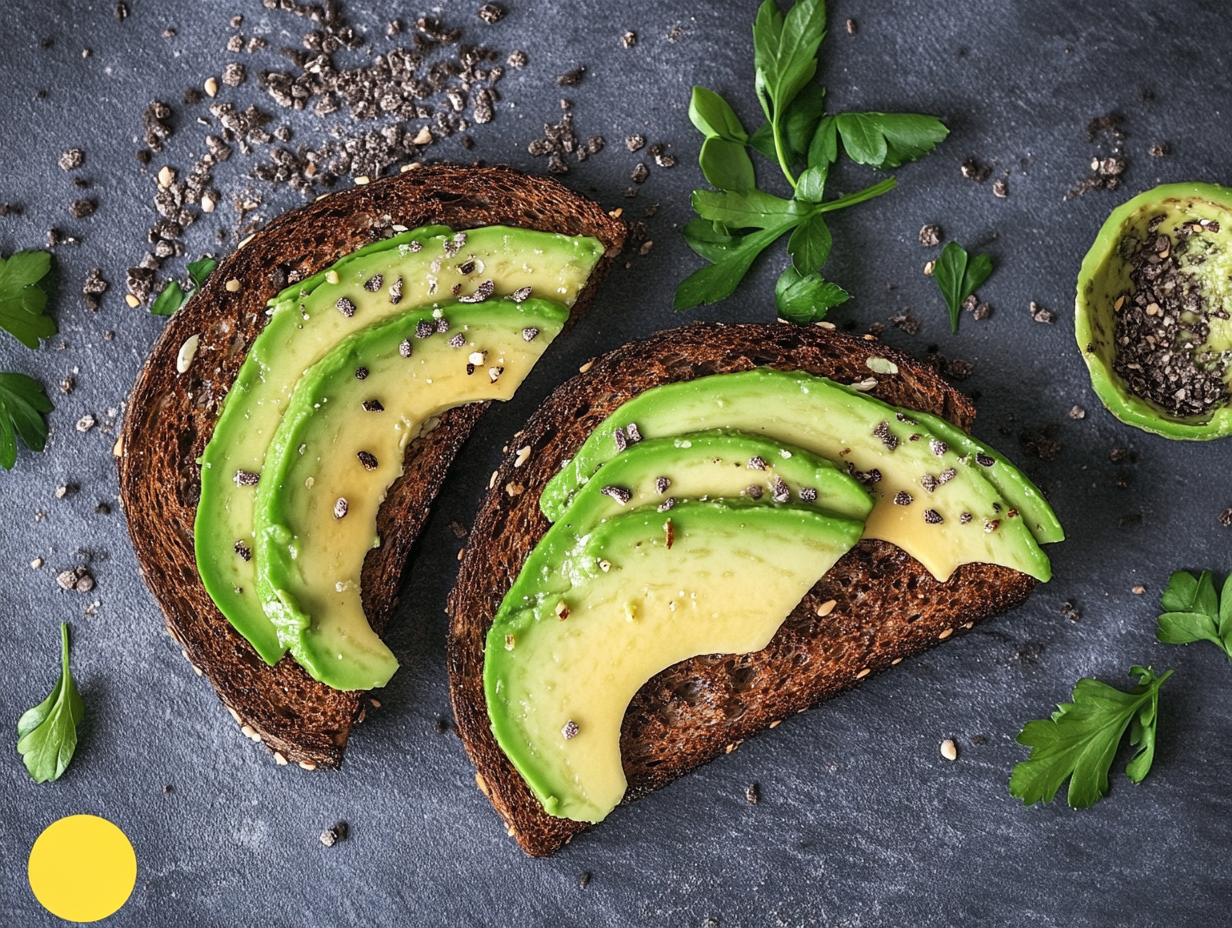Avocado toast has become a breakfast favorite for many, praised not only for its creamy, delicious taste but also for its numerous health benefits. However, as this trendy dish continues to gain popularity, one question often comes to mind: Is it okay to eat avocado toast every day? This article explores the nutritional benefits, potential drawbacks, and practical advice for incorporating avocado toast into your daily diet without compromising your health.
Nutritional Profile of Avocado
Health Benefits of Eating Avocado Toast Daily

Avocado toast isn’t just delicious; it’s packed with health benefits that make it a great addition to your daily routine. Here’s how regularly consuming this meal can positively impact your health:
1. Heart Health Benefits
One of the most significant benefits of avocados is their impact on heart health. The monounsaturated fats found in avocados help to lower LDL (bad) cholesterol while increasing HDL (good) cholesterol. According to the American Heart Association, these healthy fats are essential for maintaining cardiovascular health, reducing the risk of heart disease, and improving overall heart function. For a deeper dive into how healthy fats benefit your heart, check out Healthy Fats and Heart Health.
2. Digestive Health and Fiber
Avocados are a great source of fiber, which is crucial for digestive health. The combination of soluble and insoluble fibers helps regulate bowel movements, prevent constipation, and maintain a healthy gut microbiome. Fiber also plays a role in controlling blood sugar levels and enhancing satiety, which can help with weight management. To learn more about how fiber benefits your body, explore Avocado Nutrition Facts.
3. Weight Management
Eating avocado toast daily can be beneficial for weight management, primarily due to its high fiber and healthy fat content. These components help you feel fuller for longer, reducing the urge to snack between meals. Studies have shown that individuals who include avocado in their diets tend to consume fewer calories overall, aiding in weight control efforts.
4. Skin Health
Avocados are packed with antioxidants, such as vitamins C and E, which are essential for maintaining healthy skin. Regular consumption of avocado toast can improve skin elasticity, hydration, and overall appearance. The healthy fats in avocados also support the skin barrier, helping to keep it moisturized and protected against environmental damage.
5. Nutrient Absorption
The fats in avocados enhance the absorption of fat-soluble vitamins (A, D, E, and K) from other foods consumed alongside them. This means that pairing avocado toast with nutrient-rich foods like leafy greens, eggs, or tomatoes can maximize the nutritional value of your meal.
Potential Drawbacks of Eating Avocado Toast Every Day
While avocado toast offers numerous health benefits, it’s essential to be mindful of potential drawbacks, especially if consumed in excess.
1. High Caloric Density
Avocados are high in calories due to their fat content. Consuming a whole avocado every day can quickly add up in terms of calorie intake, potentially leading to weight gain if not balanced with other dietary factors. It’s important to practice portion control, especially if you are trying to manage your weight.
2. Overconsumption of Fats
Although the fats in avocados are healthy, it’s still possible to consume too much fat overall. Diets that are too high in fat, even healthy fats, can contribute to an imbalance in your overall nutrition. It’s recommended to limit your intake to half an avocado per serving to keep your fat intake within a healthy range.
3. Potassium Intake Considerations
Avocados are high in potassium, which is beneficial for most people but can pose risks for those with specific health conditions, such as kidney issues or those on certain medications like ACE inhibitors. High potassium intake can lead to hyperkalemia, a condition characterized by elevated potassium levels in the blood.
4. Cost and Environmental Impact
The rising demand for avocados has led to increased prices and environmental concerns, such as deforestation and water usage in avocado-producing regions. Consuming avocados in moderation and supporting sustainable sources can help mitigate some of these environmental impacts.
Balancing Your Diet with Avocado Toast

Avocado toast is a versatile and nutrient-rich meal that can be a valuable part of a balanced diet. However, due to its high caloric and fat content, it’s important to incorporate it thoughtfully to maintain overall dietary balance. Here are some tips and strategies for enjoying avocado toast while ensuring a well-rounded and healthy diet.
1. Portion Control and Frequency
- Limit Portion Size: Instead of consuming a whole avocado on your toast, aim for half or even a quarter. This reduces your calorie and fat intake while still providing you with the beneficial nutrients.
- Frequency Matters: While avocado toast can be part of your daily routine, consider enjoying it 3-4 times a week instead of every day. This approach allows you to diversify your meals and incorporate other healthy foods.
2. Healthy Pairings and Additions
Adding variety to your avocado toast can boost its nutritional value and keep your meals interesting. Here are some healthy toppings and pairings:
- Protein-Rich Additions:
- Poached or Scrambled Eggs: Adding eggs increases the protein content, making the meal more filling and balanced.
- Smoked Salmon: A great source of omega-3 fatty acids, which are essential for heart and brain health.
- Chickpeas or Beans: Adding a handful of chickpeas or black beans can boost fiber and protein intake, making the meal more satisfying.
- Vegetable Toppings:
- Tomatoes: Rich in antioxidants like lycopene, tomatoes add freshness and additional nutrients.
- Cucumber and Sprouts: These low-calorie vegetables add crunch, vitamins, and minerals without adding many calories.
- Leafy Greens: Adding spinach, arugula, or kale provides extra fiber, iron, and vitamins A and C.
- Seasonings and Spices:
- Lemon Juice: A squeeze of lemon not only enhances flavor but also adds vitamin C.
- Red Pepper Flakes: Adds a spicy kick and helps boost metabolism slightly.
- Herbs: Fresh herbs like cilantro, basil, or dill add flavor without extra calories.
3. Alternative Breads and Toast Options
The type of bread you use can significantly impact the nutritional quality of your avocado toast. Opt for healthier bread options to complement the health benefits of avocados:
- Whole Grain or Multigrain Bread: Rich in fiber and nutrients, whole grain bread helps keep you full longer and supports digestive health.
- Sourdough Bread: Easier on the stomach for some people due to its fermentation process, sourdough provides a unique flavor and beneficial bacteria.
- Seeded Bread: Bread with added seeds like flax, chia, or pumpkin seeds can increase fiber, protein, and healthy fat content.
4. Alternatives to Avocado for Variety
If you’re looking to mix things up or reduce your avocado intake, consider these nutritious alternatives:
- Hummus: Made from chickpeas, hummus is high in fiber and protein, providing a creamy texture similar to avocado.
- Nut Butters: Almond, peanut, or cashew butter can add a dose of healthy fats and protein.
- Greek Yogurt: Spread plain Greek yogurt on toast for a high-protein, probiotic-rich option that’s great with savory toppings like tomatoes and herbs.
5. Mindful Eating and Portion Awareness
- Eat Slowly and Mindfully: Take your time to enjoy your avocado toast. Eating slowly can help you recognize when you’re full, preventing overeating.
- Balance with Other Meals: If you have avocado toast for breakfast, consider lighter meals for lunch and dinner, such as salads or lean protein with vegetables, to keep your overall calorie intake balanced.
6. Incorporate a Variety of Nutrient-Dense Foods
- Rotate Your Meals: Incorporate other healthy breakfast options such as oatmeal, smoothies, or egg-based dishes to keep your diet varied.
- Include Different Fruits and Vegetables: Variety ensures you receive a wide range of nutrients essential for optimal health.
Avocado toast can be a healthy and satisfying addition to your diet when consumed mindfully. By paying attention to portion sizes, choosing complementary toppings, and varying your meal choices throughout the week, you can enjoy the benefits of avocado toast while maintaining a balanced and nutrient-rich diet. Embrace variety and moderation, and you’ll find that avocado toast can fit perfectly into a healthy lifestyle!
FAQs
Is avocado toast good for weight loss?
Yes, avocado toast can support weight loss due to its high fiber and healthy fat content, which promotes satiety. However, portion control is essential.
Can eating avocado toast every day raise cholesterol?
No, the fats in avocados are primarily monounsaturated, which are known to lower bad cholesterol levels and improve heart health.
How many avocados is too many?
For most individuals, one avocado a day is safe, but it’s important to consider your overall dietary needs and consult with a healthcare provider if you have any health conditions that may be affected by high potassium intake.
What can I eat instead of avocado toast?
Alternatives include whole-grain toast with hummus, cottage cheese, or nut butter, which provide different nutrients while still being healthy options.

Conclusion
Eating avocado toast every day can be a nutritious and satisfying part of a balanced diet when consumed mindfully. While it offers numerous health benefits, such as improved heart health, better digestion, and enhanced skin appearance, it’s important to consider portion sizes, overall calorie intake, and potential dietary imbalances. By incorporating avocado toast into a varied and balanced eating plan, you can enjoy this trendy dish without compromising your health.
Enjoy your avocado toast in moderation, pair it with other healthy foods, and always keep an eye on your overall dietary habits to make the most of this delicious and nutritious meal!

